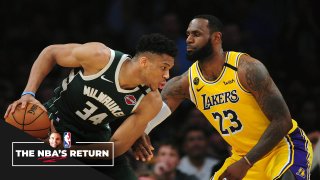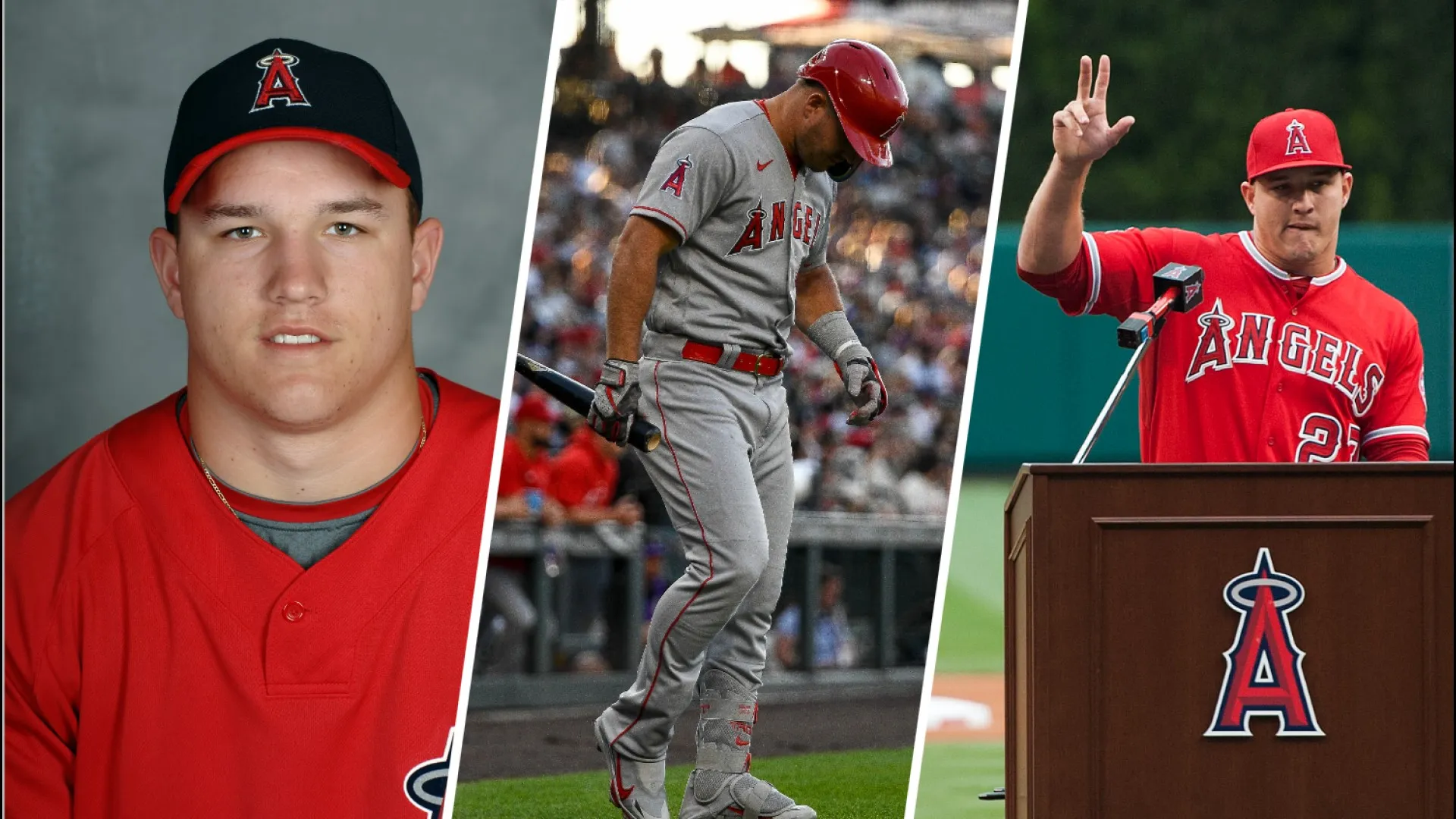
With the NBA announcing that regular-season award ballots have to be filled out this week, the Los Angeles Lakers have hit the campaign trail in Orlando and dialed up the LeBron James-for-MVP talk to ludicrous levels.
First, there was the media session following Monday’s practice in which James was asked about the race against Giannis Antetokounmpo. James pointed to his work in the Western Conference and then, following practice, tweeted the conference angle again -- just in case you didn’t see his Zoom interview. Then, on Tuesday morning, Lakers legend Magic Johnson, who signed LeBron in 2018 as the president of basketball operations, weighed in that King James was “definitely” the MVP. A few hours later, Lakers coach Frank Vogel argued for LeBron’s supreme status.
This is award season and this is what teams do, and if anyone knows how to handle awards, it’s Hollywood. I respect it, but despite what the Lakers say, there should be no debate. Antetokounmpo is the MVP.
What LeBron James is doing in Year 17 (are we still in Year 17?) is nothing short of remarkable. At 35 years old, the Lakers star is leading the NBA in assists per game for the first time of his career while spearheading the Western Conference’s best team. There are about eight things in that sentence that still don’t seem totally real. And yet, as we inch toward the resumption of the regular season, it feels like we’re forcing an MVP debate about James and Antetokounmpo because there doesn’t seem to be a ready alternative to reward LeBron’s individual greatness.
LeBron is having one of the best age-35-plus seasons ever while Antetokounmpo’s having one of the best seasons ever, period. The Greek Freak is averaging 29.6 points, 13.7 rebounds, 5.8 assists on 54.7 shooting from the floor and anchoring the best defense we’ve seen in the NBA in years. Antetokounmpo’s player-efficiency rating this season ranks in the top five in NBA history and his box plus-minus ranks in the top 10 all-time. Though historical data isn’t available, ESPN’s all-in-one metric, real plus-minus, places Antetokounmpo above James on that leaderboard as well.
James’ candidacy hinges on a reference to his age, but when did age become a critical part of the MVP conversation? I can’t remember it ever being this big of a factor. If his social media is any indication, LeBron knows playing the age card could be the ticket to his fifth MVP, regularly using #WashedKing and #RevengeSZN hashtags on his Instagram posts. I don’t know one person that called him #WashedKing or suggested he was washed, but it’s a clever marketing device.
Before the pandemic, the Bucks were on their way to winning 70 games, and Antetokounmpo will likely be the only Bucks player on an All-NBA team. Think about that. When the Golden State Warriors won 73 games, they got three names on the All-NBA list. When the Chicago Bulls won 72, Michael Jordan, who also won MVP, was first-team All-NBA alongside Scottie Pippen. Heck, when the San Antonio Spurs won 67 games in 2015-16, there were two Spurs on the list: Kawhi Leonard on the first team and LaMarcus Aldridge on the third team.
Will Giannis' co-star, Khris Middleton, make the list? Look at the group of forwards he has to beat: Antetokounmpo, James, Anthony Davis, Kawhi Leonard, Paul George, Jayson Tatum and Jimmy Butler. That’s seven players right there for six spots. If All-NBA had four teams, Middleton might be on there, but I think it’s safe to say, as of now, Antetokounmpo will likely not have a teammate on the first, second or third team. That speaks to Giannis’ singular greatness.
So where does James have Giannis cornered? It’s certainly not about conference superiority. The Bucks actually have a better record against the West (19-7) than the Lakers do against the East (16-7). Yes, the Lakers triumphantly beat the Bucks in an early March game, but it seems the Bucks’ December win over the Lakers has been erased from our collective memory.
And it’s not just the Lakers. Antetokounmpo’s Bucks waxed the Los Angeles Clippers by 28 points with both George and Leonard in uniform. In that game, Antetokounmpo registered 27 points, 11 rebounds and four assists in just 26 minutes.
Now, if you’re going to construct an argument against Antetokounmpo, you might point to his low minutes totals and say, “Hey, how can an MVP only average 30.9 minutes per game?”
Such an argument would backfire, big time.
Antetokounmpo’s minutes are so low because he’s so good that Bucks games are often over before the fourth quarter even begins. The Bucks have outscored opponents by a staggering 16.1 points per 100 possessions with Antetokounmpo on the floor. Here’s how that number stacks up against his fellow MVP candidates:
MVP Candidate On-court NetRtg
G. Antetokounmpo Plus-16.1
Kawhi Leonard Plus-11.4
LeBron James Plus-10.3
Luka Doncic Plus-6.3
James Harden Plus-5.6
Data: NBA.com
And that’s without a starry supporting cast to help him get to that number. James has Davis. Leonard has George. Doncic has Kristaps Porzingis (sidenote: KP averaged 25.2 points and 10.9 rebounds over his last 15 games before the shutdown). Harden has Russell Westbrook.
Antetokounmpo’s co-pilot is Middleton and he’s really good. The two-time All-Star is averaging 21.1 points, 6.2 rebounds and 4.1 assists per game. He’s a master of the mid-range and a solid defender on the wing, but he’s not Pippen or Klay Thompson.
Teams that dominate at this level normally have multiple Hall of Famers, but with the Bucks, it’s driven largely by a single pilot, Antetokounmpo.
When Milwaukee’s starting lineup takes the floor, the Bucks outscore opponents by 19.0 points per 100 possessions. If you sub out Antetokounmpo and keep the other four starters on the floor with his sub (usually Ersan Ilyasova), that net rating drops from 19.0 all the way down to 5.0, per PBPstats.com data -- a huge drop.
If we do the same exercise with Middleton and keep four starters on the floor (including Antetokounmpo) with Middleton’s replacement (usually Donte DiVincenzo), the Bucks’ net rating falls from 19.0 to 14.3. The Bucks are still a juggernaut. Antetokounmpo is the constant.
The same goes on the other end of the floor. While it’s not a sexy headline, the Bucks’ defense with Antetokounmpo at the forefront has been absolutely stifling. To step back for a second, in this offense-friendly era, the average scoring output in the NBA is a blazing 110 points per 100 possessions. By today’s standard, the best defensive outfits hold opponents under the 100 mark.
But there are only three five-man lineups that have a defensive rating (points allowed per 100 possessions) below the 100 mark (minimum 250 minutes played).
The Pacers sport a lineup at 99.2. The Bulls have one at 97.1.
The Bucks’ starting lineup? It’s at 89.8. That’s absurd.
One more thing: if you take Antetokounmpo off the floor, the opponent’s scoring output skies to 114.5, per PBPstats.com.
That’s a freakish impact. The Bucks have given up the most 3-pointers in the NBA by a small margin, but that comes with a calculated tradeoff (Mike Budenholzer talked about the scheme on the Habershow last year). With his go-go-gadget arms, Antetokounmpo helps to put up a wall around the paint. Amazingly, the Bucks have allowed 145 fewer baskets inside five feet than the next-stingiest team in the NBA, the Toronto Raptors. Here’s what that looks like in graph form:
Brook Lopez has been a worthy Defensive Player of the Year candidate (that’s an incredible achievement in and of itself given Lopez’s reputation as a soft rim-protector early in his career), but Antetokounmpo is just as worthy on that end. Among the 158 players who have defended at least 500 plays in Synergy Sports’ database, Antetokounmpo’s points per possession allowed is the best of them all (Leonard is second).
From an MVP perspective, the pandemic hit at an unfortunate time for James’ MVP case. The Lakers had a huge weekend in early March topping the Clippers and the Bucks, but one weekend does not a season or an MVP make. It certainly shouldn’t obscure the fact that the Lakers did not have a winning record against the Clippers (1-2), Bucks (1-1), Rockets (1-1), Raptors (0-1), Philadelphia 76ers (1-1), or Boston Celtics (1-1) this season. The only contender the Lakers have a winning record against is the Denver Nuggets (2-1), but that is mitigated by the fact that Jokic’s Nuggets actually have a positive point differential in those games (plus-11).
I suspect some voters may give James the nod simply as a “my bad” gesture. The MVP award has sometimes functioned as a way for media members to apologize when they underestimate a player or team in the preseason. Prorating their win percentage over an 82-game season, the Lakers were projected to top their Vegas over/under of 50.5 wins by a whopping 13.5 wins. That surprise factor is often the kindling of MVP campaigns.
James is no stranger to that fact, either, having lost out to Derrick Rose for MVP in 2011. The story of Rose’s unlikely rise at age-22 was so captivating that it propelled him to the award despite the metrics wholly disagreeing with him being the league’s best player. James led the league in PER and win shares that season, but he didn’t win it because Rose and the Bulls were a better story than the underachieving Miami Heat. (And defense is hard to measure.)
My sense is that the Rose corollary is what’s happening with James. With his work on and off the court and at an age when most players are in decline, he might’ve been the best pre-shutdown story going. Some media members might also feel this is James’ last good shot to win the award.
Yes, James has been amazing at his age, but Antetokounmpo’s season needs no caveats. If he wins MVP unanimously, he deserves it.
James might like it that way. We know how Stephen Curry’s unanimous MVP season ended.
Follow Tom Haberstroh on Twitter (@TomHaberstroh), and bookmark NBCSports.com/Haberstroh for my latest stories and videos and subscribe to the Habershow podcast.


